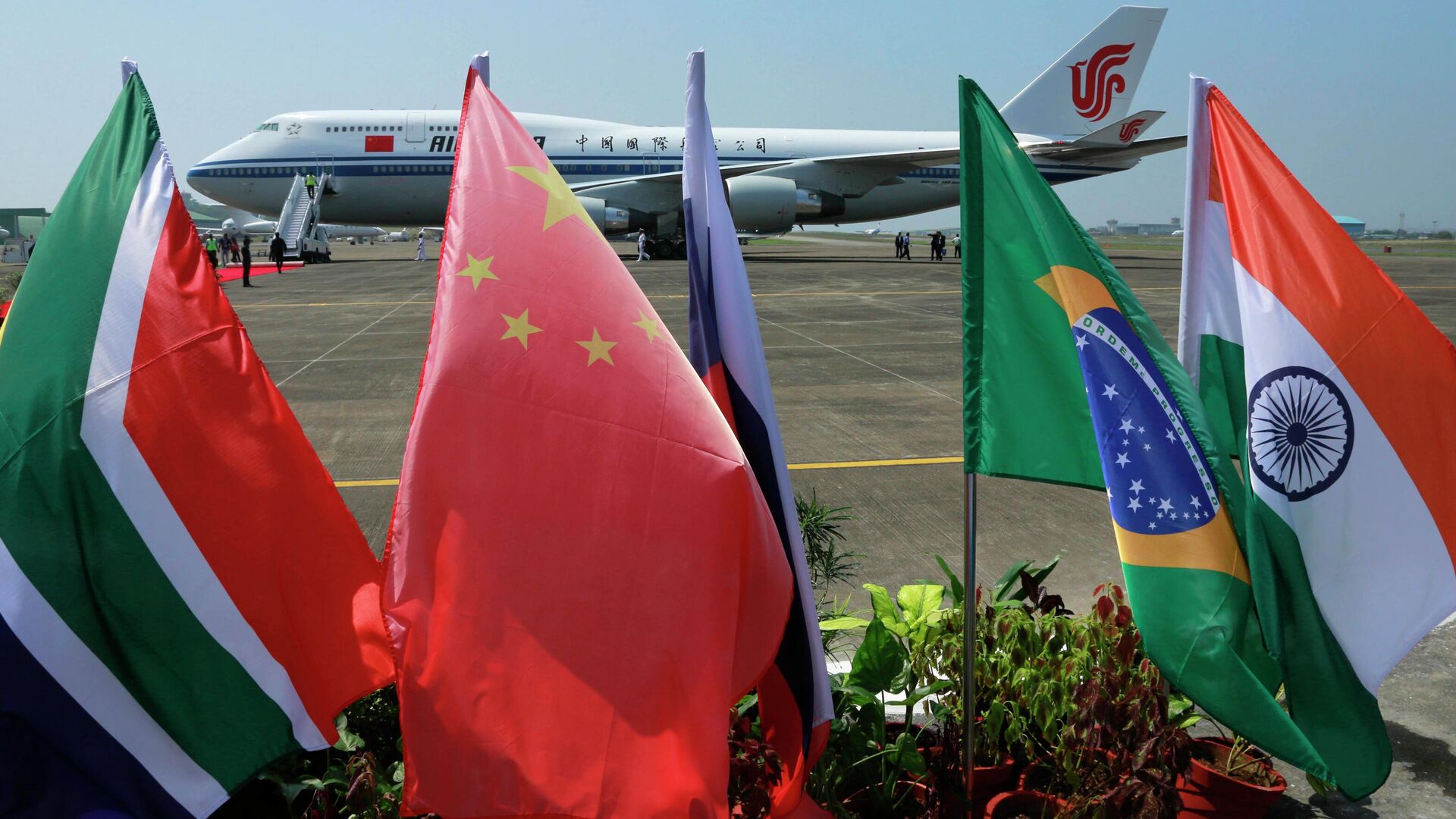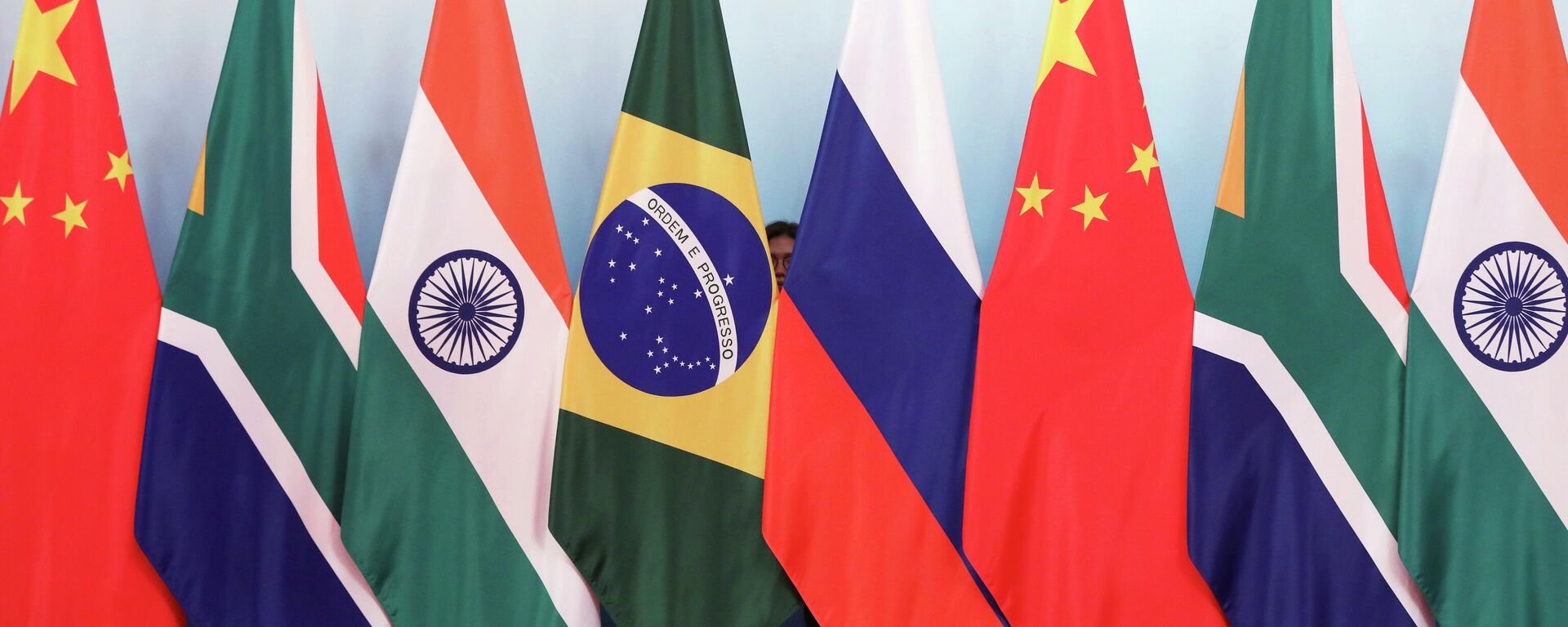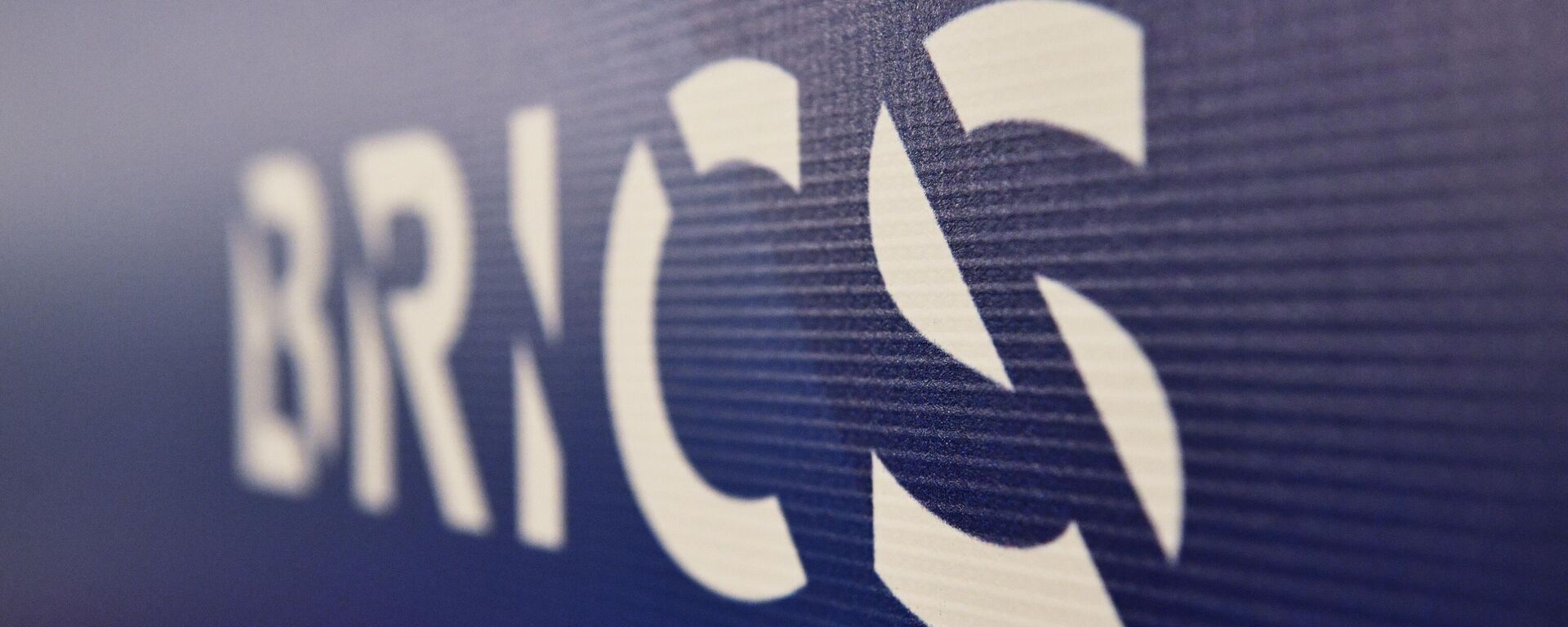https://sputnikglobe.com/20230821/whats-on-brics-2023-summit-agenda-1112763589.html
What's on BRICS' 2023 Summit Agenda?
What's on BRICS' 2023 Summit Agenda?
Sputnik International
The largest-ever gathering of heads of state of the non-Western world within the framework of BRICS is due to kick off on August 22 in Johannesburg, South Africa.
2023-08-21T17:21+0000
2023-08-21T17:21+0000
2023-08-22T05:52+0000
russia
sergey lavrov
cyril ramaphosa
wang wenbin
brazil
south africa
brics
new development bank (ndb)
world trade organization (wto)
african continental free trade agreement
https://cdn1.img.sputnikglobe.com/img/07e7/08/04/1112398163_0:141:3139:1907_1920x0_80_0_0_1e186a1ee234c40654295a9cb8ae1e2e.jpg
The 15th BRICS Summit will take place in Johannesburg's financial district of Sandton on August 22-24 headed by the leaders of Brazil, Russia, India, China and South Africa – the states which constitute the rapidly-evolving format. This year, a whopping 67 heads of states, including 53 from Africa, as well as others including Bangladesh, Bolivia, Indonesia and Iran, have been invited to the forum.Sputnik has focused on the main topics on the agenda of the largest-ever summit.Which Countries Want to Join BRICS?Twenty-three countries have formally applied for membership, which will be discussed at the 15th summit of the group. As South African President Cyril Ramaphosa said in a televised address to the nation on Sunday: "South Africa supports the expansion of the membership of BRICS."Earlier, over 40 countries, including Bolivia, Cuba, the Democratic Republic of Congo, Comoros, Gabon, and Kazakhstan, all expressed their desire to join the club of the major developing economies.Among those who jumped at the opportunity to officially apply are Argentina, Turkiye, Saudi Arabia, the United Arab Emirates, Egypt, Senegal, Algeria, Ethiopia, Iran, and Indonesia.Remarkably, many of the new BRICS applicants are from Africa. Previously, Wang Wenbin, a Chinese politician and diplomat who currently serves as a spokesman for the Ministry of Foreign Affairs, placed emphasis on the development, stating that the 15th summit would focus on the deepening partnership between BRICS and Africa to promote mutual growth, achieve sustainable development, and strengthen inclusiveness and multilateralism.BRICS CurrencyA BRICS common currency will not be on the 15th summit's agenda, as per Anit Sookal, South Africa's ambassador at large for Asia and BRICS. The top diplomat told journalists last month that even though the common currency project wouldn't be discussed at the August gathering, BRICS nations would continue to move away from the US dollar.How Could BRICS Change the World Economy?Increased turnover of national currencies in international economic transactions, de-dollarization, the improvement of payment mechanisms, as well as the strengthening of the role of the New Development Bank and the BRICS Contingent Reserve Arrangement are the key economic topics that will be discussed in detail at the group's 15th summit.Lavrov highlighted that BRICS' ability to influence the global agenda are determined by objective factors: first, the population of the BRICS countries is over 40%; second, the group's territories exceed a quarter of the world's land; third, in 2023 BRICS is estimated to account for about 31.5% of global GDP (at purchasing power parity), while the share of the group of major industrialized nations comprising the Group of Seven has fallen to 30%. According to some estimates, the combined GDP of the BRICS countries in 2023 will exceed $27.6 trillion.At the same time, the Russian foreign minister emphasized that BRICS does not aim to replace existing multilateral mechanisms, let alone become a new "collective hegemon". On the contrary, the BRICS countries have consistently advocated the creation of conditions for the development of all states, which excludes the Cold War-style "blocs" approach and zero-sum geopolitical games. "BRICS seeks to offer inclusive solutions based on a participatory approach," Lavrov stressed.What is the Purpose of the New Development Bank?At the 15th summit, the BRICS nations are expected to consider boosting local currency funding and lending within the New Development Bank (NDB) to thwart the impact of foreign exchange volatility and the US dollar's unexpected strength driven by aggressive interest rate hikes by the US Federal Reserve. The Fed's borrowing cost hikes backfired on emerging economies that take loans and buy basic commodities denominated in US dollars, bolstering the Global South's determination to drift away from the greenback.The New Development Bank – formerly known as the BRICS Development Bank – was established in 2015 by BRICS nations with the aim of mobilizing resources for infrastructure and sustainable development projects in emerging markets and developing countries (EMDCs).In 2018, the African Regional Center of the NDB in South Africa was opened; in 2019, 2020 and 2022, similar structures were established in Brazil, Russia and India. In March 2020, the bank launched a $10 billion assistance program to combat the COVID-19 pandemic and overcome its socio-economic consequences.As of January 30 this year, the NDB had approved 83 investment projects totaling more than $30.1 billion. Most recently, South Africa has received 100 billion rands ($5.27 billion) from the bank for the construction of roads, water supply and energy, as South African President Cyril Ramaphosa announced on Sunday.What is the Strategy for BRICS' Economic Partnership?The Strategy for BRICS Economic Partnership 2025 (or BRICS Strategy) was adopted by the five BRICS member-states in November 2020, defining steps to jointly address new global challenges, including macroeconomic shocks and financial volatility.The BRICS nations vowed to stimulate strong economic growth and support the multilateral trading system based on the rules and principles of the World Trade Organization (WTO) while resisting unilateral and protectionist measures that contradict the spirit and rules of the WTO.BRICS Strategy also focuses on digitization that helps raise effectiveness and economic competitiveness, improve living standards, and overcome cumulative social, economic, and infrastructure imbalances, in order to ensure sustainable growth.The strategy's major principles include full respect for the economic sovereignty of the member states; commitment to international law; openness, sharing of information and consensus in decision-making; recognition of the multipolar nature of the international economic and financial system; commitment to supporting sustainable development, strong, balanced and inclusive growth; as well as a commitment to mutually beneficial cooperation within BRICS.What is BRICS and Its Purpose?The acronym BRIC (Brazil, Russia, India and China) was coined by the Goldman Sachs economist Jim O'Neill, who argued in his 2001 report Building Better Global Economic BRICs that the emerging economies "should be the building blocks of freshly overhauled global financial and governance systems."In June 2006, BRIC was founded by the ministers of economy of Brazil, Russia, India, and China within the framework of the St. Petersburg Economic Forum (PEF). The initiator of the creation of the new association was Moscow. On December 24, 2010, BRIC invited South Africa to join the club. Thus, the group earned its name BRICS.In 2022, BRICS announced that it would expand the number of member countries to make the organization more inclusive.Since January 1, South Africa has been chairing BRICS under the motto: "BRICS and Africa: a partnership for joint accelerated growth, sustainable development and inclusive multilateralism."South African chairing priorities include the strengthening of multilateralism; reform of global governance institutions; post-pandemic economic recovery; sustainable development and exploring the potential of the African Continental Free Trade Agreement; deepening cooperation in the spheres of equitable energy transition and combating climate change; as well as transforming of education and increasing the meaningful participation of women in peace processes.
https://sputnikglobe.com/20230711/multilateralism--reforms-how-brics-currency-offers-better-deal-for-global-south-1111820744.html
https://sputnikglobe.com/20230727/brics-bank-intends-to-facilitate-use-of-national-currencies-in-transactions-1112190310.html
https://sputnikglobe.com/20230821/lavrov-brics-can-become-one-of-pillars-of-new-world-order-1112756353.html
https://sputnikglobe.com/20230602/argentina-can-reportedly-join-brics-new-development-bank-as-early-as-august-1110852911.html
https://sputnikglobe.com/20230821/pepe-escobar-brics-plus-sco-super-bloc-vs-us-empire-1112730061.html
https://sputnikglobe.com/20230112/from-unipolar-world-to-multipolarity-why-us-attempts-to-intimidate-africa-wont-work-1106251327.html
https://sputnikglobe.com/20230816/brics-2023-who-are-participants--guests-of-the-summit-1112636718.html
russia
brazil
south africa
Sputnik International
feedback@sputniknews.com
+74956456601
MIA „Rossiya Segodnya“
2023
News
en_EN
Sputnik International
feedback@sputniknews.com
+74956456601
MIA „Rossiya Segodnya“
Sputnik International
feedback@sputniknews.com
+74956456601
MIA „Rossiya Segodnya“
brics 2023 summit, what is brics summit about, which country will host brics 2023 summit, why did south africa join brics, brics summit list, what is brics summit, 15th brics summit, will putin attend brics summit, brics summit 2023 countries, brics expansion, brics common currency, brics currency, dedollarization, dedollarisation, brics summit date
brics 2023 summit, what is brics summit about, which country will host brics 2023 summit, why did south africa join brics, brics summit list, what is brics summit, 15th brics summit, will putin attend brics summit, brics summit 2023 countries, brics expansion, brics common currency, brics currency, dedollarization, dedollarisation, brics summit date
The 15th BRICS Summit will take place in Johannesburg's financial district of Sandton on August 22-24 headed by the leaders of Brazil, Russia, India, China and South Africa – the states which constitute the rapidly-evolving format.
This year, a whopping 67 heads of states, including 53 from Africa, as well as others including Bangladesh, Bolivia, Indonesia and Iran, have been invited to the forum.
Sputnik has focused on the main topics on the agenda of the largest-ever summit.
Which Countries Want to Join BRICS?
Twenty-three countries have formally applied for membership, which will be discussed at the 15th summit of the group. As South African President Cyril Ramaphosa said in a televised address to the nation on Sunday: "South Africa supports the expansion of the membership of BRICS."
Earlier, over 40 countries, including
Bolivia,
Cuba, the Democratic Republic of Congo, Comoros, Gabon, and Kazakhstan, all expressed their desire to join the club of the major developing economies.
Among those who jumped at the opportunity to officially apply are Argentina, Turkiye, Saudi Arabia, the United Arab Emirates, Egypt, Senegal, Algeria, Ethiopia, Iran, and Indonesia.
An incentive to expand the group stems from the tectonic geopolitical changes which started to take shape during the COVID-19 pandemic and accelerated after the beginning of the Russian special military operation in Ukraine. A series of sweeping Western sanctions slapped on Russia have further disrupted the already fragile supply chains and global trade, hurting tremendously the countries of the Global South. The latter started to consider BRICS as an alternative platform for the world economy and lined up for membership in an organization that is expected to grow larger over time.
Remarkably, many of the new BRICS applicants are from Africa. Previously, Wang Wenbin, a Chinese politician and diplomat who currently serves as a spokesman for the Ministry of Foreign Affairs, placed emphasis on the development, stating that the 15th summit would focus on the deepening
partnership between BRICS and Africa to promote mutual growth, achieve sustainable development, and strengthen inclusiveness and multilateralism.
A BRICS
common currency will not be on the 15th summit's agenda, as per Anit Sookal, South Africa's ambassador at large for Asia and BRICS. The top diplomat told journalists last month that even though the common currency project wouldn't be discussed at the August gathering, BRICS nations would continue to move away from the US dollar.
How Could BRICS Change the World Economy?
Increased turnover of national currencies in international economic transactions, de-dollarization, the improvement of payment mechanisms, as well as the strengthening of the role of the New Development Bank and the BRICS Contingent Reserve Arrangement are the key economic topics that will be discussed in detail at the group's 15th summit.
"The international community is tired of the blackmail and pressure from the Western elites and their colonial and racist manners. That is why, for example, not only Russia, but also a number of other countries are consistently reducing their dependence on the US dollar, switching to alternative payment systems and national currency settlements," Russian Foreign Minister Sergey Lavrov wrote in his article BRICS: Towards a Just World Order for South Africa’s Ubuntu Magazine on August 21.
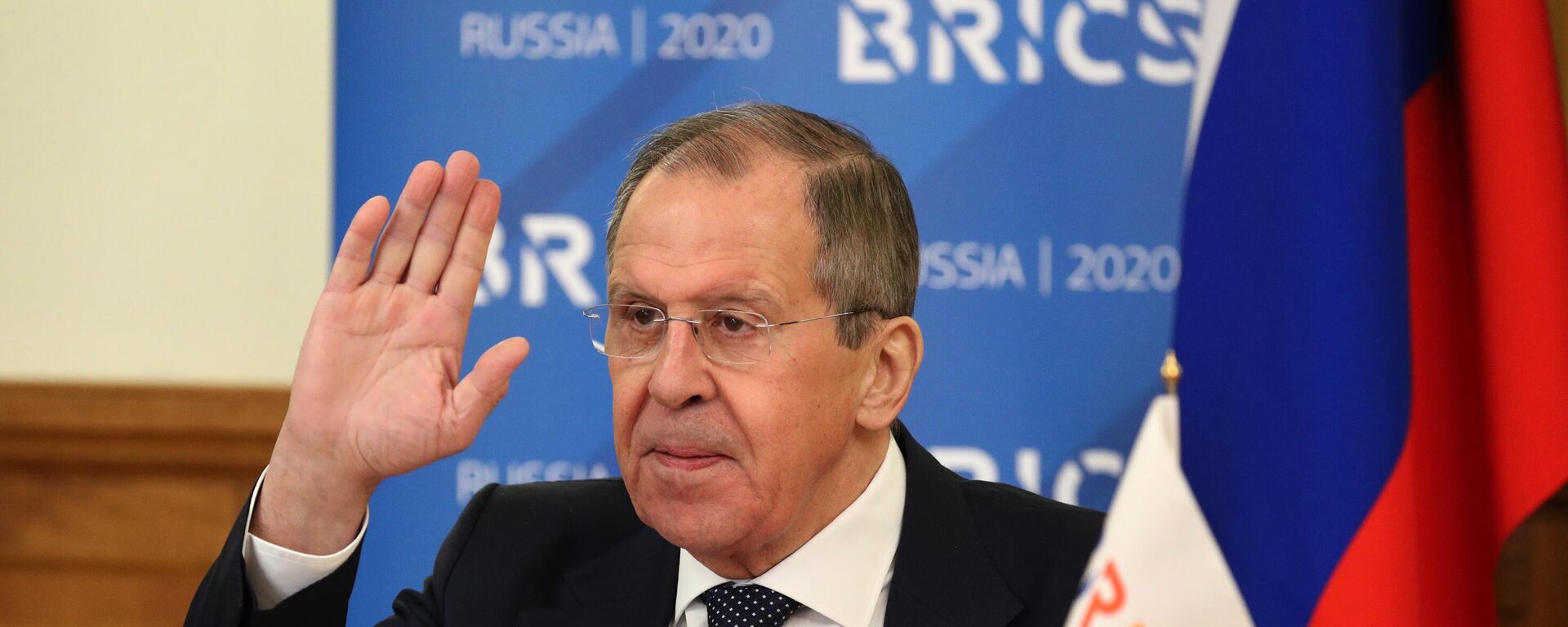
21 August 2023, 14:09 GMT
Lavrov highlighted that BRICS' ability to influence the global agenda are determined by objective factors: first, the population of the BRICS countries is over 40%; second, the group's territories exceed a quarter of the world's land; third, in 2023 BRICS is estimated to account for about 31.5% of global GDP (at purchasing power parity), while the share of the group of major industrialized nations comprising the Group of Seven has fallen to 30%. According to some estimates, the combined GDP of the BRICS countries in 2023 will exceed $27.6 trillion.
At the same time, the Russian foreign minister emphasized that BRICS does not aim to replace existing multilateral mechanisms, let alone become a new "collective hegemon". On the contrary, the BRICS countries have consistently advocated the creation of conditions for the development of all states, which excludes the Cold War-style "blocs" approach and zero-sum geopolitical games. "BRICS seeks to offer inclusive solutions based on a participatory approach," Lavrov stressed.
What is the Purpose of the New Development Bank?
At the 15th summit, the BRICS nations are expected to consider boosting local currency funding and lending within the New Development Bank (NDB) to thwart the impact of foreign exchange volatility and the US dollar's unexpected strength driven by aggressive interest rate hikes by the US Federal Reserve. The Fed's borrowing cost hikes backfired on emerging economies that take loans and buy basic commodities denominated in US dollars, bolstering the Global South's determination to drift away from the greenback.
The New Development Bank – formerly known as the BRICS Development Bank – was established in 2015 by BRICS nations with the aim of mobilizing resources for infrastructure and sustainable development projects in emerging markets and developing countries (EMDCs).
In 2018, the African Regional Center of the NDB in South Africa was opened; in 2019, 2020 and 2022, similar structures were established in Brazil, Russia and India. In March 2020, the bank launched a $10 billion assistance program to combat the COVID-19 pandemic and overcome its socio-economic consequences.
As of January 30 this year, the NDB had approved 83 investment projects totaling more than $30.1 billion. Most recently, South Africa has received 100 billion rands ($5.27 billion) from the bank for the construction of roads, water supply and energy, as South African President Cyril Ramaphosa announced on Sunday.
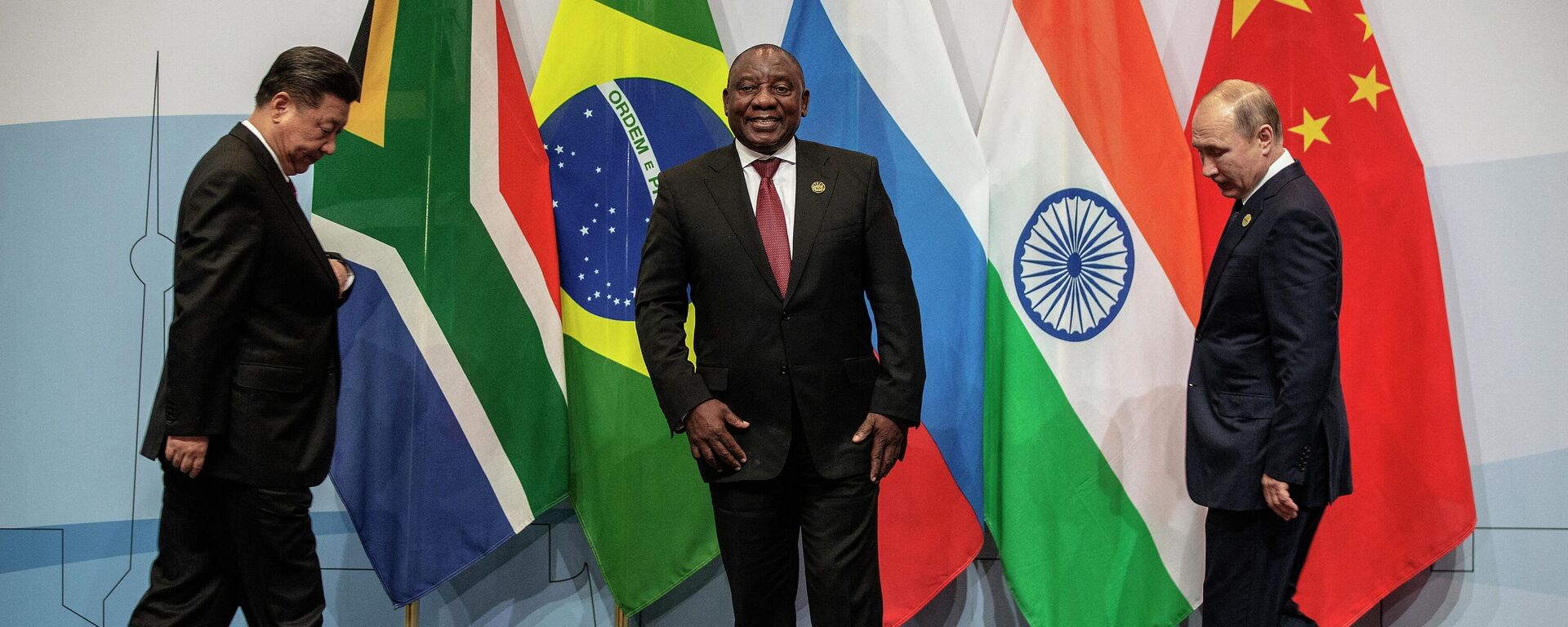
21 August 2023, 15:00 GMT
What is the Strategy for BRICS' Economic Partnership?
The Strategy for BRICS Economic Partnership 2025 (or BRICS Strategy) was adopted by the five BRICS member-states in November 2020, defining steps to jointly address new global challenges, including macroeconomic shocks and financial volatility.
The BRICS nations vowed to stimulate strong economic growth and support the multilateral trading system based on the rules and principles of the World Trade Organization (WTO) while resisting unilateral and protectionist measures that contradict the spirit and rules of the WTO.
BRICS Strategy also focuses on digitization that helps raise effectiveness and economic competitiveness, improve living standards, and overcome cumulative social, economic, and infrastructure imbalances, in order to ensure sustainable growth.
The strategy's major principles include full respect for the economic sovereignty of the member states; commitment to international law; openness, sharing of information and consensus in decision-making; recognition of the multipolar nature of the international economic and financial system; commitment to supporting sustainable development, strong, balanced and inclusive growth; as well as a commitment to mutually beneficial cooperation within BRICS.
"The Strategy for Economic Partnership 2025, which defines the benchmarks of cooperation in the mid-term, is being implemented," as Russian Foreign Minister Lavrov noted in his latest article.
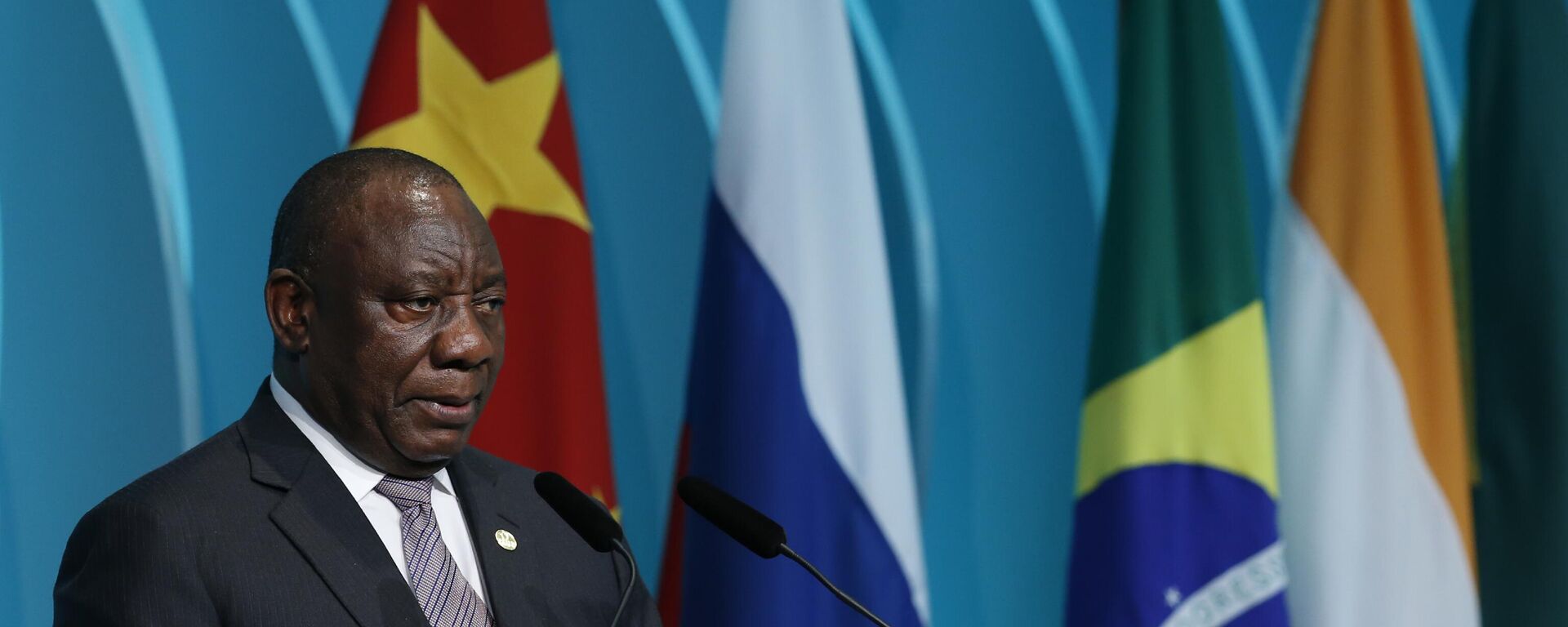
12 January 2023, 13:53 GMT
What is BRICS and Its Purpose?
The acronym BRIC (Brazil, Russia, India and China) was coined by the Goldman Sachs economist Jim O'Neill, who argued in his 2001 report Building Better Global Economic BRICs that the emerging economies "should be the building blocks of freshly overhauled global financial and governance systems."
In June 2006, BRIC was founded by the ministers of economy of Brazil, Russia, India, and China within the framework of the St. Petersburg Economic Forum (PEF). The initiator of the creation of the new association was Moscow. On December 24, 2010, BRIC invited South Africa to join the club. Thus, the group earned its name BRICS.
In 2022, BRICS announced that it would expand the number of member countries to make the organization more inclusive.
Since January 1, South Africa has been chairing BRICS under the motto: "BRICS and Africa: a partnership for joint accelerated growth, sustainable development and inclusive multilateralism."
South African chairing priorities include the strengthening of multilateralism; reform of global governance institutions; post-pandemic economic recovery; sustainable development and exploring the potential of the African Continental Free Trade Agreement; deepening cooperation in the spheres of equitable energy transition and combating climate change; as well as transforming of education and increasing the meaningful participation of women in peace processes.
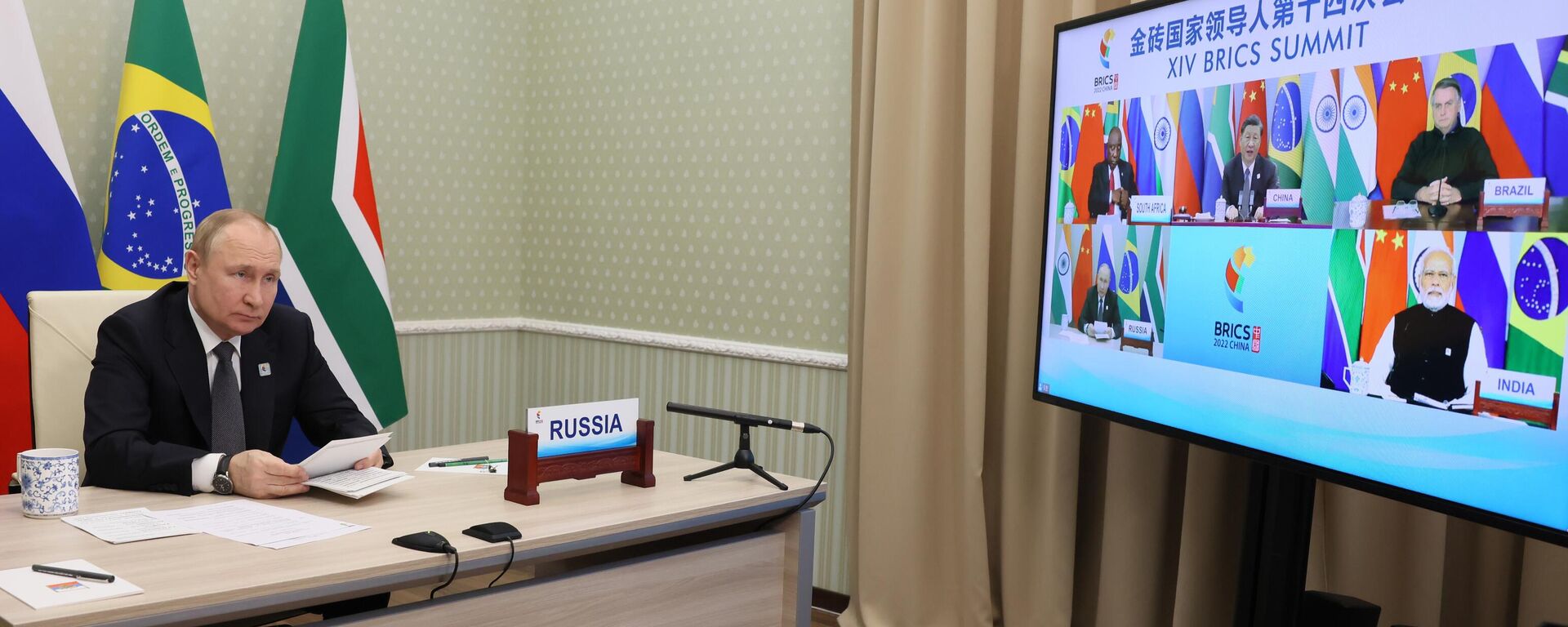
16 August 2023, 13:39 GMT
